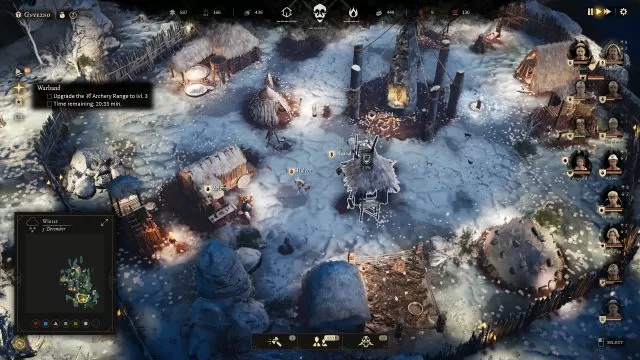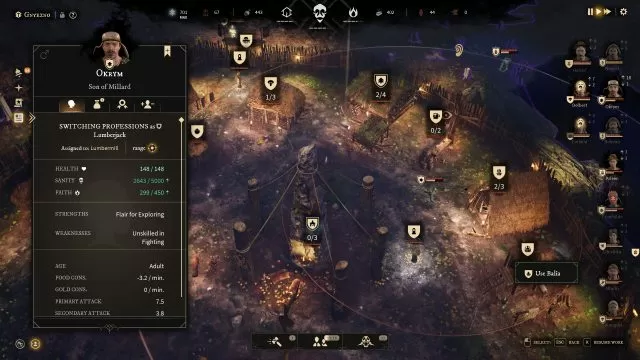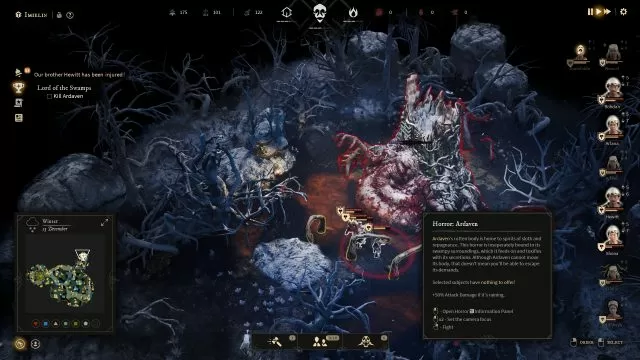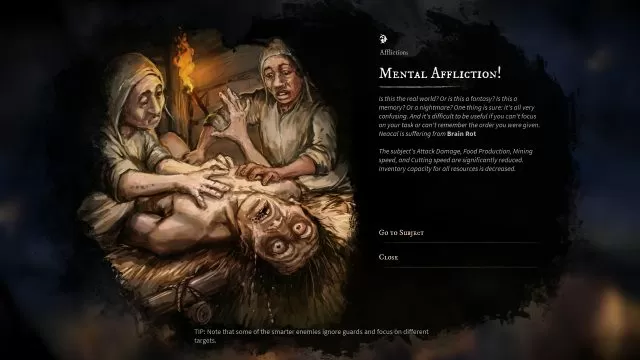Gord Review – Mudpunk
Have you ever contemplated living in the swamp village from the medieval fairy tales/games? Not being a hero, just existing as the pauper in the dark and dangerous bog from Baba Yaga, Witcher, or Diablo worlds. Every living thing outside stockade wants to kill you, eat your eyes, or lay its eggs in your abdomen; sporadic entertainment comes from drinking mead and brawling; squishing mosquitoes, wallowing through mud, using open-air toilets and digging roots for sustenance makes eighty percent of your days. Short life expectancy almost comes as a blessing in those circumstances.
Enter Gord, a tactical RPG/ colony simulation that tries to gamify the challenge of living and thriving in such a community. The game is based on Slavic mythology, at least how it’s understood in the West. It has pagan gods, mud, misery, and monsters with really weird names. It also has child sacrifices. Yes, really. Someone wanted shock value in their game and implemented the worst possible idea, guaranteed to turn your stomach around.
In his majesty’s service

In Gord, you act as a commanding presence in the service of the all-conquering king, engaged in the logistic preparations for the future conquest of the North. You direct the Tribe of the Dawn, people indigenous to these parts, in creating the path for the army. The campaign consists of linear missions, each starting with raising the palisade for your Gord. Being Slavic myself, I must admit that I never heard about that moniker for a fortified village. Perhaps it’s a Polish thing, as developer hail from there.
Once you set the wooden boundary, you’ll develop economy, a prerequisite for chasing all subsequent story objectives. Gathering wood, clay, reeds, and mushrooms, fishing, hunting, and mining is essential for material development. There’s also a spiritual component, satisfied by building the temple and assigning your villagers to pray in it. Each of your subjects is a named individual with specific strengths and flaws, although those are not nearly important as in similar games. Some flaws are highly circumstantial, never coming into play in a typical scenario. For instance, Okrim’s fear of poloz (snakes) makes no impact on a map without those. People are unique and not at all expendable. They procreate slowly, kids take forever to grow up, and every unnecessary death is detrimental to success.
Extremely tedious micromanagement

In Gord, the challenge lies in micromanagement. Manually directing villagers is the staple of gameplay, which becomes very tiresome after a while. For starters, your subjects don’t have any sense of self-preservation. When ambushed outside of the Gord, they will happily engage in combat with giant spiders, goblins, crocodiles, or whatever, no matter the odds, instead of fleeing for the relative safety of the stockade. When assigned to a particular farming building, they will simply stop working after they exhaust the resources in the visible range. Assigning a torch-bearing scout or two to find more resources is a remedy for the fog of war, but not even that can be automated. You’ll need to babysit scouts every step of the way, manually steering them from suicidal skirmishes they are also prone to.
Besides HP, villagers have sanity and faith meters, with the former being more important. Sanity mainly drops when working outside or facing individual fears. Low-sanity individuals are prone to random acts of violence and general unpredictability and require alcohol for calming their nerves. Again, you will manually need to assign the nervous wrecks to a meadery, monitor their progress, and direct them back to work after the “therapy session”. All this is very, very tiresome in the later campaign. Babysitting sixteen individuals, using a horrendous interface can be taxing when a stream of mini disasters pings your attention non-stop.
Slavic mysticism with super-dark undertones

Mythological bestiary is based on Slavic folklore. Those include Horrors, monstrous deformed beasts who act as region bosses, often requiring you to complete a task for them. Engaging with Horrors is sometimes mandatory, requiring either a sacrifice or combat. That choice is mostly fictitious, as they can easily wipe the floor with your weekend warriors. Near the beginning of the campaign, to finish the map, you can either offer a child to be devoured or try to kill the monster, with the latter option being practically impossible on the default difficulty level. The worst thing about interactive child sacrifice is the absence of moral repercussions or penalties. You’ll just move on, as if nothing had happened, making the terrible deed devoid of meaning.
Warfare, in general, is also poorly executed. Apart from a suitable villager candidate, recruiting archers, axemen, and spearmen requires specific buildings, initial payment in gold, and monetary upkeep. Having extra warriors means fewer people in the economy and fewer resources to sustain troops. When you run out of gold for the upkeep, warriors will begin to lose sanity at a much faster rate. Any death or injury can further exacerbate the sanity loss, requiring constant treks back to Gord for alcoholic infusion. When engaged in combat, your ad-hoc warriors will attack random foes, demanding micromanagement regarding targeting and positioning. Would it be so hard to make archers automatically disengage from the melee at the start of the combat?
There are better options than Gord

The campaign story is also not very interesting, as the game lacks engaging characters and quickly runs out of fresh ideas. Most missions require repeating the process of setting up the economy, with minimal variations, usually regarding available resources. Long winter mission will have you hunting deer instead foraging for mushrooms, for example. Tedious micromanagement is the worst offender in Gord, especially if you experienced other games of this type. I liked the dark aesthetics of swampy forests here, but almost everything else left me wanting. This is not the Gord you are looking for.
Highs
- Dark aesthetics are pleasing to the eye.
- Slavic mythology is always a plus.
Lows
- Repeating missions and lack of truly interesting gameplay ideas.
- Horrendous, bloated interface.
- Child sacrifices. I mean, really?

